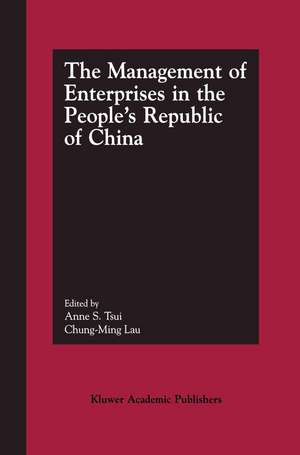The Management of Enterprises in the People’s Republic of China
Editat de Anne S. Tsui, Chung Ming Lauen Limba Engleză Paperback – 22 oct 2012
| Toate formatele și edițiile | Preț | Express |
|---|---|---|
| Paperback (1) | 1227.52 lei 6-8 săpt. | |
| Springer Us – 22 oct 2012 | 1227.52 lei 6-8 săpt. | |
| Hardback (1) | 1231.78 lei 6-8 săpt. | |
| Springer Us – 30 aug 2002 | 1231.78 lei 6-8 săpt. |
Preț: 1227.52 lei
Preț vechi: 1496.99 lei
-18% Nou
Puncte Express: 1841
Preț estimativ în valută:
234.89€ • 245.86$ • 195.50£
234.89€ • 245.86$ • 195.50£
Carte tipărită la comandă
Livrare economică 31 martie-14 aprilie
Preluare comenzi: 021 569.72.76
Specificații
ISBN-13: 9781461353928
ISBN-10: 1461353920
Pagini: 524
Ilustrații: VII, 510 p.
Dimensiuni: 155 x 235 x 28 mm
Greutate: 0.73 kg
Ediția:Softcover reprint of the original 1st ed. 2002
Editura: Springer Us
Colecția Springer
Locul publicării:New York, NY, United States
ISBN-10: 1461353920
Pagini: 524
Ilustrații: VII, 510 p.
Dimensiuni: 155 x 235 x 28 mm
Greutate: 0.73 kg
Ediția:Softcover reprint of the original 1st ed. 2002
Editura: Springer Us
Colecția Springer
Locul publicării:New York, NY, United States
Public țintă
ResearchDescriere
With China's eminent entry into the World Trade Organization, past speculations of China becoming a world economic power in the 21st century is a reality with which few would disagree. We are witnessing the awakening of many sleepy giants, such as the successful reformed state-owned as well as township and village enterprises. We are also witnessing the birth and growth of a significant private sector, along with ever-increasing foreign investments. In this development process, there is a critical need to document and theorize about the management process by firms in this changing and dynamic context.
The Management of Enterprises in the People's Republic of China aims to contribute to the knowledge base of management within the Chinese context. The book begins with a mapping of research on management in PRC, and offers theoretical insights for cross-context, institutional, and behavioral studies. It then reports the results of fourteen empirical studies of management issues in the PRC firms. The issues studied include SOE transformation, globalization, governance, employment relationships, managerial networks, corporate culture and leadership. Also included are studies on the knowledge management process and management team characteristics of high technology firms. The methods of study include large-scale surveys, case studies, and interviews. The contributors are international experts in Chinese management research. Finally, we offer executive perspectives on several successful firms operating in China through interviews with their CEOs.
The Management of Enterprises in the People's Republic of China aims to contribute to the knowledge base of management within the Chinese context. The book begins with a mapping of research on management in PRC, and offers theoretical insights for cross-context, institutional, and behavioral studies. It then reports the results of fourteen empirical studies of management issues in the PRC firms. The issues studied include SOE transformation, globalization, governance, employment relationships, managerial networks, corporate culture and leadership. Also included are studies on the knowledge management process and management team characteristics of high technology firms. The methods of study include large-scale surveys, case studies, and interviews. The contributors are international experts in Chinese management research. Finally, we offer executive perspectives on several successful firms operating in China through interviews with their CEOs.
Cuprins
Part I: Mapping Research on Management in the People's Republic of China. 1. Research on the Management of Enterprises in the People's Republic of China: Current Status and Future Directions; A.S. Tsui, C.-M. Lau. 2. Constructing Cross-Context Scholarly Conversations; D.A. Whetten. 3. The Management of People in Chinese Enterprises; T.W. Lee. 4. The Changing World of Chinese Enterprise: An Institutional Perspective; W.R. Scott. Part II: Macro Perspectives. 5. Reforming State-Owned Enterprises: Diversifying Ownership Versus Improving Management; D.D. Li, C. Wu. 6. Internal Capital Market Misallocation and Inefficient External Capital Market: The Guangdong Enterprises Group; J. He, L. Lu. 7. Networks and Incentives in Transition: A Multilevel Analysis of the Pharmaceutical Industry; S. White, X. Liu. 8. From Politics to Markets: A Case Study of Chinese Firms' Strategic Adaptation; Y. Xu, H. Li. 9. Knowledge Management of High-Tech Firms; C.-M. Lau, et al. 10. Corporate Governance Mechanisms; D.K.K. Fan, et al. 11. Decentralized Enterprise Reform: Notes on the Transformation of State-Owned Enterprises; M.W. Meyer, et al. Part III: Micro Perspectives. 12. Social Capital of the Firm and Its Impact on Performance: A Social Network Analysis; Y. Bian. 13. Sources and Moderators of Employee Stress in State-Owned Enterprises; J.L. Xie. 14. Leader Behaviors and Employee Turnover; X.-P. Chen. 15. Employment Relationship with Chinese Middle Managers: Exploring Differences Between State-Owned andNon-State-Owned Firms; A.S. Tsui, et al. 16. Characteristics and Processes of Top Management Teams in High-Tech Firms; P.P. Fu, et al. 17. Corporate Culture in State-Owned Enterprise: An Inductive Analysis of Dimensions and Influences; K.R. Xin, et al. 18. An Inductive Analysis of the Construct Domain of Organizational Citizenship Behavior; J.-L. Farh, et al. Part IV: Executive Perspectives. 19. Speaking for Themselves: Conversations with Four Chinese CEOs; A.S. Tsui. About the Contributors. Index.






